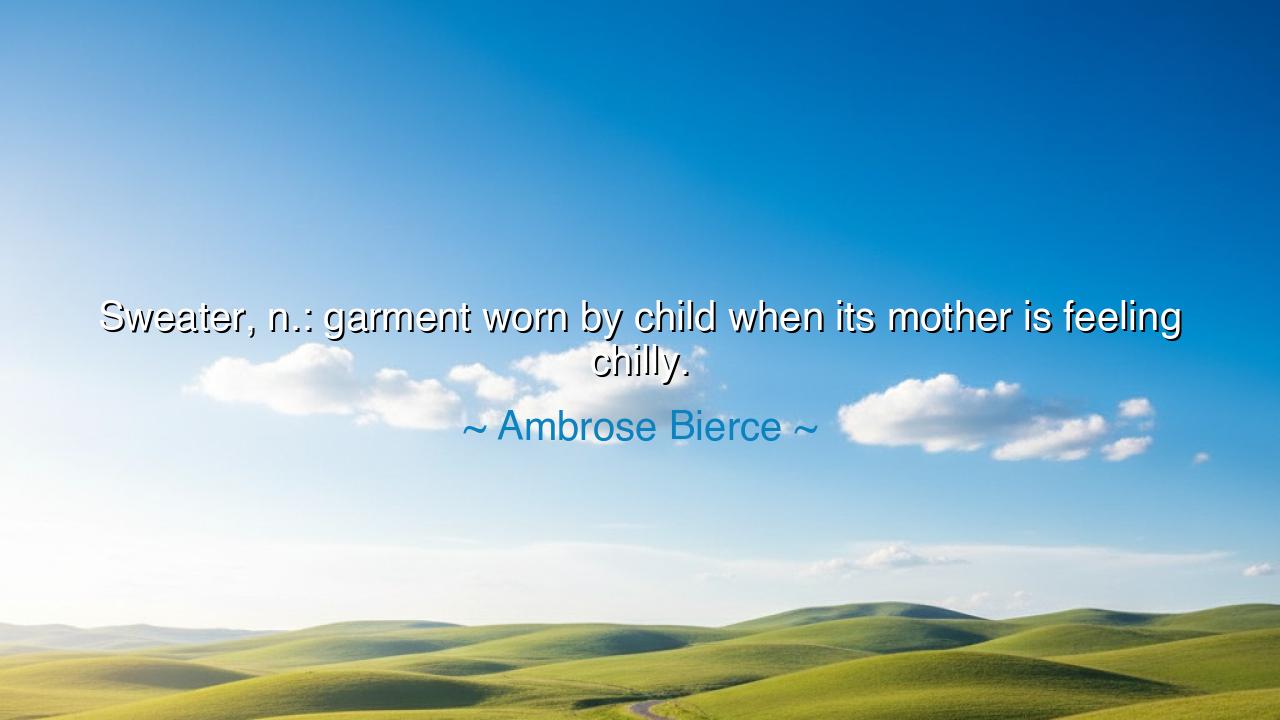
Sweater, n.: garment worn by child when its mother is feeling






Hearken, O seekers of subtle wisdom, to the playful yet profound words of Ambrose Bierce, who wrote in The Devil’s Dictionary: “Sweater, n.: garment worn by child when its mother is feeling chilly.” Though humorous in tone, this line conceals a tender truth about maternal love—its instinct to protect, to nurture, to project care even when it surpasses reason. Bierce, a man known for his sharp wit and cynicism, here unveils something softer: the beautiful irrationality of a mother’s concern, that boundless empathy which feels her child’s comfort as her own.
In this ironic definition, Bierce uses humor as a mirror of affection. The mother, feeling cold herself, wraps her child in warmth—not because the child needs it, but because she feels they must. It is the perfect emblem of the maternal instinct, that mysterious sensitivity which connects mother and child beyond logic or distance. She sees her comfort only through theirs, her peace only through their protection. What appears as folly or overprotection is, in truth, the essence of love: to give more than is necessary, simply because one cannot bear to do less.
The origin of the quote lies in Bierce’s celebrated work The Devil’s Dictionary, first published in the early 20th century—a collection of satirical definitions that mocked human folly, hypocrisy, and sentimentality. Yet, in this particular line, the satire softens. Bierce, whose writings often carried a tone of bitter skepticism, allows tenderness to break through his irony. It is as though even the sharpest observer of human weakness could not mock the selflessness of a mother’s love without reverence hidden beneath his jest.
The image of a mother insisting her child wear a sweater though the day is mild is universal, almost mythic. It transcends time and culture. It echoes the archetype of the protective mother found in every civilization—from the goddess Demeter guarding her daughter Persephone, to the peasant woman shielding her child from winter’s chill. The act is small, but it carries cosmic symbolism: love forever striving to preserve life, even against unseen dangers. The child may protest, but the mother knows a deeper truth—that love does not always wait for consent, for care acts even when it is uninvited.
History, too, holds real echoes of Bierce’s gentle jest. Consider Marie Curie, the great scientist and mother, who labored through fatigue and poverty not only for knowledge, but for her daughters’ future. Her care was not confined to the laboratory or the home; it was woven into every decision, every sacrifice. Though she might not have placed a sweater on her child out of imagined chill, she wrapped them in another form of warmth—the warmth of perseverance, of moral example, of enduring devotion. Bierce’s humorous exaggeration thus becomes symbolic: all mothers, in their way, cover their children against the invisible cold of life.
The lesson within Bierce’s wit is both humble and eternal: that love’s greatest acts are often born not of logic, but of feeling. The mother’s concern may seem misplaced, her gestures overprotective—but behind them lies the raw truth of empathy, that divine foolishness that keeps humanity tender. True love, as this saying reveals, is rarely efficient; it is instinctive, overflowing, sometimes irrational, and yet the foundation of all goodness in the world.
Therefore, let all who hear this teaching remember: cherish the small absurdities of care, for they are signs of deep affection. When one insists you wear a coat, eat a meal, or rest though you feel strong—know that it is not command but compassion speaking. And to the mothers of the world, take comfort in Bierce’s jest, for even in his satire he could not hide admiration. The sweater, after all, is not just cloth; it is the woven symbol of a love that feels another’s cold more sharply than its own.






AAdministratorAdministrator
Welcome, honored guests. Please leave a comment, we will respond soon